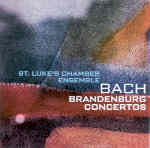These are excellent, modern-instrument performances flavored by a fine sense of period style. The St. Luke’s Chamber Ensemble boasts an impressive roster of talent, and every soloist makes a distinguished contribution to the proceedings. In the Second Concerto, trumpeter Chris Gekker plays with brilliance and panache, his tone less reedy than that of many of his “authentic instrument” colleagues. Flutist Elizabeth Mann does outstanding work everywhere that she appears, and she really comes into her own in the Fourth Concerto, which is performed about as well as it can be. The wind soloists manage to find an ideal sectional balance in the difficult First Concerto, highlighted by irresistible energy in the quicker movements. Polyphonic textures in the strings-only Third and Sixth Concertos offer clarity without scruffiness or any sacrifice in tonal warmth.
If there’s any fly in this enticing ointment, it occurs in the Fifth Concerto, where Robert Wolinsky’s harpsichord, though certainly well played and characterful in the great first-movement cadenza, sounds a touch feeble compared to his fellow soloists. This is often a problem with modern instrument performances, particularly as we have gotten used to more assertive continuo playing in the decades since the period instrument folks burst upon the scene. But that’s not really the issue here: this is a keyboard concerto first and foremost, and while the exceptionally clear and detailed recording loses nothing of importance and Wolinsky’s colleagues hardly hog the spotlight, it would have been nice had he chosen a more powerfully projecting instrument. On the whole, it’s a minor blemish in a set that serves as a worthy successor to the classic I Musici recording for Philips, perhaps as polished and appealing a collection of modern-instrument Brandenburgs as we have any right to expect.
































